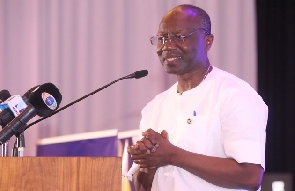 Finance Minister, Ken Ofori-Atta
Finance Minister, Ken Ofori-Atta
The Finance Ministry, has said its COVID-19 preliminary assessments, taking into consideration the revenue shortfall impact, direct health-related spending, additional expenditures including programmed expenditures for the Coronavirus Alleviation Programme, the payment of outstanding government claims to health-related sectors of the economy (National Insurance Trust Fund), and identified government intervention programmes, puts the fiscal gap at about GH¢ 21.42 billion (i.e. Revenue Shortfall Impact GH¢ 15.85 billion + COVID-19 related expenses of GH¢ 5.57 billion).
According to the Ministry, the current domestic market conditions in the wake of the pandemic has reduced liquidity on the market.
“Since the beginning of the year, there have been sell-offs by non-resident investors, which has heightened these liquidity constraints. Therefore, financing the residual gap would not only significantly increase domestic interest rates but would be counterproductive by denying the private sector access to cheaper sources of financing,” a statement said.
“Global financing conditions have also worsened as investors have negative sentiments towards emerging markets. As a result, the international capital markets remain largely closed to emerging market issuances.
“The identified financing measures of Government, including the IMF Rapid Credit Facility (US$1.0 billion), the World Bank DPO (US$350 million), Stabilisation Fund (US$219 million) still results in a residual financing gap of about GH¢ 17.9 billion to be sourced from both the domestic and external markets.
“While we are in the early stages, work done by the Ministry of Finance (MoF) and the Bank of Ghana (BoG) on the initial potential impact of the COVID-19 Pandemic on various sectors of the economy show that real GDP growth will slow down significantly from the projected 6.8 percent to 1.5 percent, with lingering effects on economic activity into 2021 and beyond. To address this, the President has directed the Ministry of Finance to come up with a stabilisation and revitalisation plan for the country. In this regard, the Ministry is developing a 3-year Covid-19 Alleviation and Revitalization of Enterprise Support Program (The Ghana CARES Program) to help stabilize and revitalize the economy.
“Given these exceptional circumstances and the challenges highlighted above, the Minister for Finance, the Governor of the Bank of Ghana, and the Controller and Accountant General, as required under Section 30 of the Bank of Ghana Act, 2002 (Act 612) as amended, have agreed to trigger the emergency financing provisions under the law, which permits increasing the limit on the purchase of Government securities by Bank of Ghana in the event of any emergency, to help finance the residual expenditures.
“The Government, therefore, decided to launch a special COVID-19 Relief Bond programme with a size of GH¢10.0 billion. The coupon rate is pegged to the prevailing monetary policy rate with a 10-year tenor and 2-year moratorium on both principal and interest payments. The Bank of Ghana released the first tranche of the facility amounting to GH¢5.5 billion to the Ministry of Finance on Friday, 15th May 2020.
“This is consistent with global policy responses of Central Banks with large scale asset purchases to provide support to manage the pandemic.”